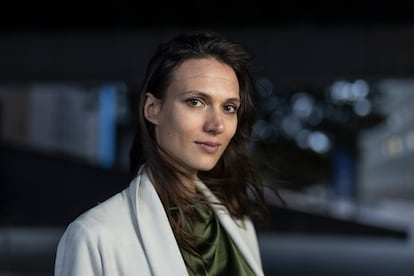The model who fled the catwalk: ‘Fashion closes its eyes to anorexia. If you gain weight, you’re out’
Nikolett Bogár previously worked for top labels. Now, she studies female professionals’ eating disorders as a result of pressure from the fashion industry


Nikolett Bogár looked beautiful on the outside but was broken on the inside. Now 30, she was 20 years old when she decided to quit the fashion industry. She modeled for the best fashion labels: Armani, Dolce & Gabbana, Chanel, Dior. She shined. But she was “miserable.” She hated her body despite the applause she received on the catwalk. She had suffered from anorexia since before the age of 15, when she started in the fashion industry. She didn’t eat, did too much exercise and compared herself to her peers. She says it was “a shitty life, even if it seemed otherwise from the outside.” After publishing her book The Fashion Industry and Eating Disorders, the native Hungarian is now embarking on a research project at Budapest’s Semmelweis University on the links between fashion and eating disorders. “There is a much higher prevalence of pathology among models. The data should help to rethink the sector,” she argued in a lecture she gave at Spain’s Bellvitge hospital. EL PAÍS spoke to Bogár after that presentation.
Question. Why did you leave the fashion industry?
Answer. I was living unhealthily. I was unhappy. I was miserable. I felt that I was only focused on eating very little, doing a lot of exercise, taking care of my image and staying slim. I had no other goals. Even when I was successful, it wasn’t satisfying. I was frustrated with my life, even though it might appear otherwise from the outside.
Q. Is this a common feeling in the profession?
A. Yes. I don’t know if it’s very common, but I know colleagues who went through the same thing. We models are valuable because of the way we look. That’s all. The other areas of our personality are not important, and nobody cares what you are like [as a person], what you like and what you don’t like. The only thing that counts is how you look, and at a certain point it’s degrading.
Q. How did you get into fashion?
A. When I was 15 I went to a modeling competition. I didn’t want to be a model, I wanted to be thin enough to be considered pretty. I ended up winning and accepted the opportunity to start a career, but after three years I realized that I didn’t like it. I already had an eating disorder [it lasted five to six years], from which I recovered two years after leaving the industry. Working as a model clearly limited my recovery.
Q. You are now studying the relationship between fashion and eating disorders. Does the industry promote them?
A. It leads you to be very, very thin. My research finds that 14.6% of models have symptoms of subclinical anorexia, while in the control group it is 2.7%. It is a significantly higher prevalence [in the fashion industry].
Q. Who is responsible for that?
A. Everyone blames someone else. We could say that the agents put pressure on the models, but they argue that they represent the needs of other clients: magazines, photographers, designers. In turn, [those actors] will tell you that the clients buy the clothes they market based on current beauty standards and that it’s a consequence of that. It’s a vicious cycle that can only be broken with a change in the industry.
Q. What is the pressure from the fashion industry and agents like?
A. I had anorexia and my agent used me as an example. I was super thin, I didn’t eat, and he would say, ‘You have to look like her. If she can do it, you can do it.’ He put pressure on the others that way, and I put even more pressure on myself to be thinner.

Q. Is it easy to feel guilty and feel like you are not doing enough?
A. It happened to me all the time. I felt I had to lose more weight, I compared myself to others, I looked at their legs or if their stomach was flatter than mine. It was like that all the time. I went for many months eating almost nothing, I did exercise every day, I walked everywhere to lose more weight...
Q. Wage pressure also limits the detection of and recovery from eating disorders.
A. Models can be thousands of euros in debt to their agencies. It’s a serious problem. At first they pay for your travel and your stay, and then you have to pay the money back. If you want to work internationally you have to be in Paris or Milan, live there, go to castings. You don’t get hired while you’re in Hungary. You have to be there for a long time to make yourself known. Sometimes they hire you and pay you €10,000 for a shoot, but maybe you don’t work again for a year. It’s a problem, because you run out of funds, and you can’t pay your debts. It’s a common thing.
Q. Governments try to regulate the industry with minimum weights. Are such policies helpful?
A. No. Brands and agents have strategies for getting around any regulations. I once worked in Madrid, where we had to guarantee a minimum body mass index (BMI). We went to do the mandatory check with heavy objects placed under our clothes to falsify the certificate. The agents told us that we had to do it that way, with loose clothing, because otherwise we could not participate. These are not isolated cases. A girl participating in my research explained her case to me: she got a medical certificate for six months, and after one month she had lost all the weight again. It certified that she had a BMI that she really didn’t have.
Q. What measurements does the industry require?
A. They ask for below the traditional measurements of 90-60-90 centimeters [or 36–24–36 inches]. Now, in haute couture they look for two centimeters less in the hips, which is very little for tall models. The same goes for the waist and bust.
Q. Is it possible to meet such requirements without suffering?
A. For some people it is. Not everyone suffers, but for most it is hard. They have to go on a strict diet, do exercise... We have to rethink the industry through data, studies and statistics because otherwise it is extremely difficult to change anything. We need to do longitudinal studies to see the relationship between years in the fashion industry and the impact on disorders. I was proud of being thinner than everyone else. I judged them because I felt they were fatter than me.
Q. What is the recovery process like?
A. It was very difficult. I realized that I didn’t want to live the way I was living and have a shitty life, always be sick. When I realized that, I started to meet friends and mimic what they did: I knew what a normal portion of food was, normal sizes... I started to eat more and live more. My life started to have more color and I started to be happier. It was a positive cycle.
Q. How does the fashion industry deal with eating disorders?
A. It closes its eyes. There is no help because they don’t care. If you want to recover from a disorder, you need to gain weight. And if that happens, you’re out.
Q. Society has evolved in terms of feminism. Has the fashion industry been left behind?
A. There are more curvy models than before, but the vast majority are still very thin. Out of every 100 professionals, four are curvy and the rest are super slim.
Sign up for our weekly newsletter to get more English-language news coverage from EL PAÍS USA Edition
Tu suscripción se está usando en otro dispositivo
¿Quieres añadir otro usuario a tu suscripción?
Si continúas leyendo en este dispositivo, no se podrá leer en el otro.
FlechaTu suscripción se está usando en otro dispositivo y solo puedes acceder a EL PAÍS desde un dispositivo a la vez.
Si quieres compartir tu cuenta, cambia tu suscripción a la modalidad Premium, así podrás añadir otro usuario. Cada uno accederá con su propia cuenta de email, lo que os permitirá personalizar vuestra experiencia en EL PAÍS.
¿Tienes una suscripción de empresa? Accede aquí para contratar más cuentas.
En el caso de no saber quién está usando tu cuenta, te recomendamos cambiar tu contraseña aquí.
Si decides continuar compartiendo tu cuenta, este mensaje se mostrará en tu dispositivo y en el de la otra persona que está usando tu cuenta de forma indefinida, afectando a tu experiencia de lectura. Puedes consultar aquí los términos y condiciones de la suscripción digital.








































